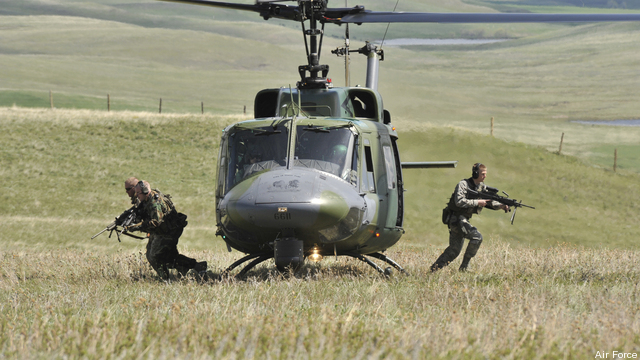Dozen Lawmakers Object To Sole-Source UH-1N Replacement
Posted on

Air Force UH-1N helicopter during an emergency drill.
CORRECTED program cost WASHINGTON: Not so fast, Air Force, a dozen legislators said as the service moved towards a $1.4 billion sole-source replacement of its aging UH-1N helicopters. The Hueys — direct descendants of the famed Vietnam-era bird — carry security teams to far-flung missile silos in an emergency, but their poor performance in counterterrorism drills has the Air Force saying it needs to bypass the normal competitive process and buy replacements in a hurry, specifically much more powerful and expensive Sikorsky UH-60 Black Hawks.
Wait a minute, the members of Congress counter. The Air Force already tried the “so urgent we have to sole-source” argument, six years ago. Congress said “no” then, the 12 signatories say, and it should say “hell no” now.
The letter (reproduced below) is dated Thursday and addressed to the chairman and ranking Democrat of the House Armed Services Committee. HASC just happens to be finishing its closed-door drafting of the annual defense policy bill, the National Defense Authorization Act, and is now headed into two weeks of public mark-ups. The letter’s objective is to influence this process, ideally by getting a “thou shalt compete” commandment into the 2017 NDAA and by preventing any reprogramming of 2016 money in the meantime.
Six members of HASC signed the letter: Republicans Duncan Hunter (Calif.), Doug Lamborn (Colo.), Frank Lobiondo (NJ), Austin Scott (Ga.), and Bill Shuster (Penn.), as well as Pennsylvania Democrat Robert Brady. While none of these men is a subcommittee chairman, they are significant middleweight players. Lamborn in particular represents Colorado, home of Strategic Command, which oversees the missile fields. Also signing were six legislators who dot sit on the HASC: Brendan Boyle (Penn.), Ryan Costello (Penn.), Blake Farenthold (Tex.), Michelle Grisham (N.M.), Patrick Meehan (Penn.), and Lynn Westmoreland (Ga.).
Unsurprisingly, five of the 12 signatories are from Pennsylvania. The state hosts major facilities of helicopter manufacturer Sikorsky, now part of Lockheed Martin, which wants to make up for major Army cuts in purchases of its UH-60. It’s also hosts Finmeccanica’s AgustaWestland, which has offered less powerful but also less costly helicopters it argues are more than adequate to a non-combat mission.
The letter argues a sole-source award is bad for the industrial base and doesn’t save that much time. Sole-sourcing doesn’t skip all the bureaucratic steps, and in this particular case the Air Force has already laid much of the groundwork for a competition.
Finally, the letter says, the “urgency” of the replacement is entirely self-inflicted. “Had the USAF held a competition when the requirement was first identified” — way back in 2004 — “those aircraft would be operating today,” the signatories said. It would set “a terrible precedent,” they say, for a service to be able to bypass the normal acquisition process to deal with a crisis its own inaction created.
Correction: The original version of this article put the cost of the program at approximately $900 million. That was last year’s budget estimate for a different approach; the sole-source approach and buying larger helicopters — among other factors — increase the cost to $1.4 billion for the helicopters that do nuclear security missions; the complete cost to replace all UH-1N helicopters would be $2.4 billion.
Subscribe to our newsletter
Promotions, new products and sales. Directly to your inbox.
